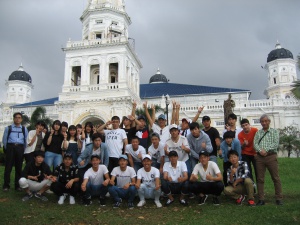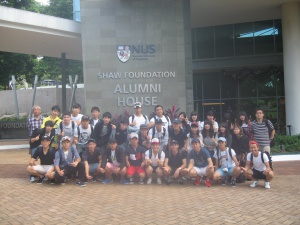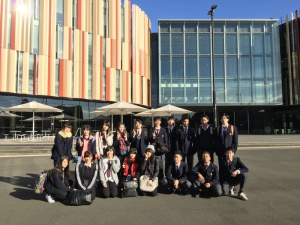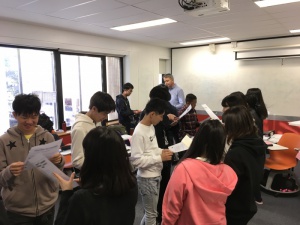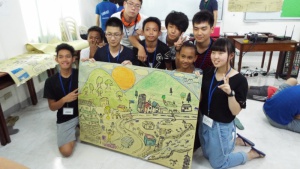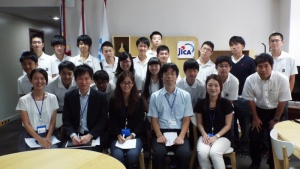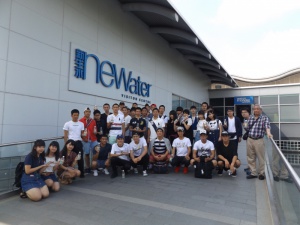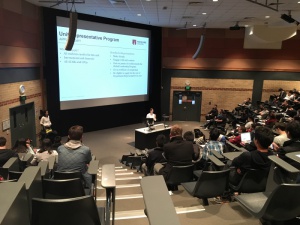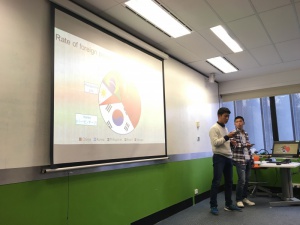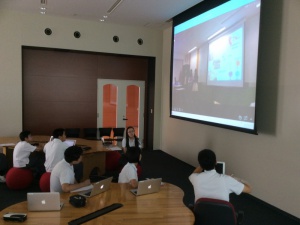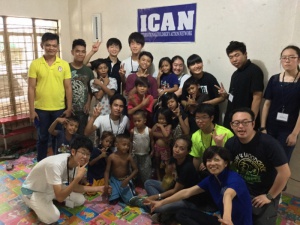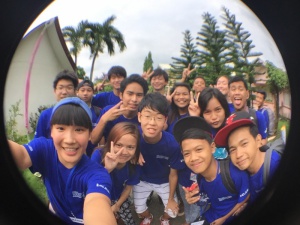SGH Training for International Understanding
We will introduce how the exploratory study of SGH.
International Understanding Trip – Singapore & Malaysia Course (2017/11/20-24)
2nd Graders from the HS General Course participated in an international understanding trip in Malaysia and Singapore. The purpose of the trip was to experience two different societies with very different economic backgrounds. There were three main activities in the trip: a) a home visit in Malaysia, b) training at NUS (National University of Singapore), and c) learning about water resources. Students received lessons on the History of Singapore and the History of NUS. Throughout the five days students experienced different walks of life, increasing their awareness of global diversity, and the importance of water resources.
Australia Course (July 15-August 26, 2017)
- 5th Grade students from the 6-Year Integrated General Course spent more than one month in Australia partaking in a cultural exchange. First they went to Sidney and took classes at Macquarie University. Classes centered around English learning through multicultural symbiosis. After three weeks of classes, students went to different local high schools and stayed with their host parents for the remaining weeks. The experience allowed NIHS students to experience the daily lives of similarly aged Australian students, deepening their appreciation of other cultures.
Philippine Course (June 25-July 10, 2017)
- 5th Grade students from the 6-Year Integrated General Course spent two weeks in the Philippines learning about social issues related to poverty. NIHS students visited the environment of children living on the streets in the center of Manilla. Students had the opportunity to interact and befriend street children, as well as familiarize themselves with NGO activities trying to protect these children. Students also visited local schools and Japanese companies in Manilla. They had the opportunity to listen to Fair Trade seminars, and experience first-hand the effects of poverty on a nation’s livelihood.
Malaysia,Singapore Course (November 21-25, 2016)
Our students went to Malaysia and Singapore to investigate their water supply. In order to prepare for the trip, lecturers from Malaysia and Singapore came to NIHS to explain about the current situation.
Ultimately, during their investigation, students were able to see how the local pipeline works to supply local people with drinkable water. Our students had the opportunity to visit sites where seawater and sewage water is recycled and converted into fresh, drinkable water. They were also introduced to a pond where the locals collect rainwater to use in their daily lives. They were able to see just how difficult it is for the locals to get fresh water. They were able to understand why we shouldn’t take the water we use everyday for granted.
Australia Course (July 16-August 27, 2016)
The contents of the training were divided into two sessions of three weeks each, and the first session was held at MacQuarie University. Through study by means of the active learning format with “multi-cultural symbiosis” as key words, we deepened understand in regards to the topics of “the difference in culture between Japan and Australia”, “mono-culture and multi-culture”, “aborigines and discrimination,” and more. While the students were there, they were constantly aware and learning progressively to grasp the events around them logically and critically, and as a conclusion, they made presentations on themes related to “Multi-cultural symbiosis.” The image of these presentations was streamed live to younger students in Japan conducting SGH activities so that what they learned on location was remitted to domestic students.
For the second three weeks the group was divided among seven high schools so they could experience the high school life on location. It was three weeks of actually experiencing multi-cultural society that they had learned about in the first three week period, so when it was time to return home, the students’ faces were full of confidence and gave the impression of maturing through this training.
Manila Course (June 26-July 10, 2016)
Our school conducted an approximately two week overseas training program in Manila, the Philippines dealing with SGH “Economic Activity and Poverty.”
For training, we learned in our exchanges about societal problems centered on poverty by visiting local high schools and caregiving facilities for children and through having tours of Japanese companies.
In the beginning, we visited our coordinating school, LaSalle High School, and other high schools, and conducted exchanges with local students, observed classes, did hands on food preparation, had lunch together, and gave cultural presentations. As part of the cultural exchange, students conveyed Japanese culture by introducing Japanese yukata (summer kimono) and jinbei (casual summer wear). In addition, they gave a rendition of “Souran Bushi” (traditional song and dance of fishery workers). This was a great success and deepened our exchange with the local schools.
Next, we held exchanges with street children and visited a trash disposal facility observing the daily life of street children near central Manila.
We observed a drop-in center (a temporary caregiving facility for children), a home for children (a long-term caregiving facility for children) and housing for youths living on the streets. We held exchanges by actually staying two nights and three days with the children there. Staying together with these children, under the slogan of “One Dream One Voice One Action,”we broke through national and linguistic barriers, talked about common causes by considering together “an ideal place,”and experienced a very deep kinship between the students and children. While together, the students engaged proactively, tried to communicate with the children in Tagalog (the native language), and displayed a positive attitude.
In addition, as part of career education, we visited Japanese companies active in the Philippines and had a chance to talk with their employees and staff. We had exchanges with those working at JICA (Japan International Cooperation Agency), JAL (Japan Airlines) and entrepreneurs. The company visits were good opportunities for students to consider their futures.
After returning home, as output from the things they had learned from their experiences, they sold Fair Trade items on location at their school culture festival. They promoted the ideas of Fair Trade, economic disparity, and poverty.


